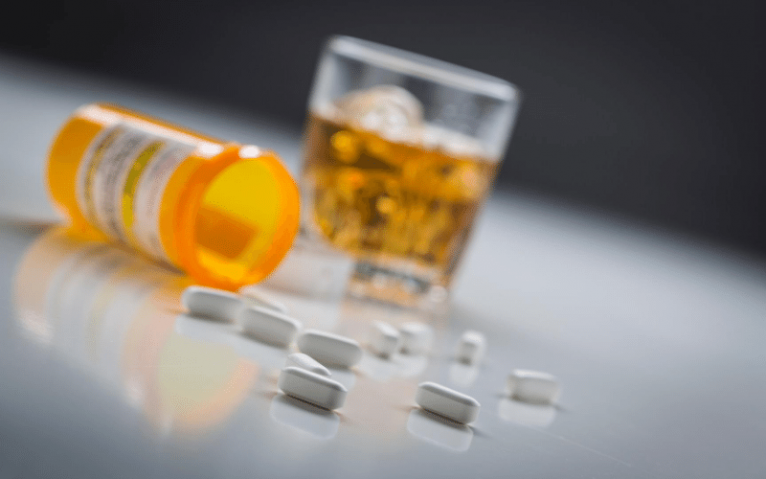Percocet, an opioid painkiller commonly used for post-dental surgery pain and broken bone pain management, becomes exponentially more dangerous when combined with alcohol. Mixing alcohol and Percocet can bring life-threatening consequences and increase someone’s chances of overdosing. There’s no doubt that mixing drugs and alcohol is a dangerous practice, and the combination of alcohol and Percocet is no different.
What is Percocet?
Percocet, which goes by the generic name oxycodone, is a powerful prescription opioid and a popular pain reliever. Milligram for milligram, it’s about twice the strength of morphine.
In the United States, it is classified as a Schedule II controlled substance. This means that it has medical value yet poses high risks for addiction and abuse. Physical dependence can occur in as little as a month of daily use.
While Percocet can help patients safely manage moderate to severe pain, it also has the potential for abuse. Oxycodone interacts with opioid receptors in the brain and blocks the transmission of pain signals in the nervous system. However, it also causes sedation and euphoria by unleashing a surge of dopamine, which rewires the brain’s reward system and makes people crave more.
How Dangerous is Mixing Alcohol and Percocet?
Both Percocet and alcohol produce physical dependence and withdrawal symptoms on top of overwhelmingly intense mental cravings. When combining oxycodone and alcohol, the risks of each are magnified. Both drugs function as central nervous system depressants, causing symptoms such as:
- Slowed breathing
- Respiratory depression
- Constipation
- Inability to focus
- Low blood pressure
- Increases the risk of liver damage
- Heart attack
- Colon cancer
- Coma
- Death
Someone doesn’t even have to be an alcoholic or a drug addict to be at risk for an oxycodone overdose, nor do they have to take alcohol and oxycodone at precisely the same time. If someone misuses their Percocet prescription and drinks alcohol with their dinner, they could experience some of these life-threatening signs.
Alcohol and Percocet Overdose
Mixing alcohol and Percocet can often lead to overdose. Because both substances act as depressants, they essentially shut the body down. Without prompt treatment, serious health effects and even death can occur.
Signs of overdose on Percocet and alcohol include:
- Respiratory depression
- Clammy skin
- Coma
- A bluish tint to the lips or nails
- Slowed heart rate
- Constriction of the pupils
- Slowed heart rate
- Hypotension
- Circulatory Collapse
- Cardiac arrest
- Death
What Would Overdose Look Like?
Well, it’s characterized by dangerously decreased breathing, heart rate, blood pressure, and a loss of consciousness. Other symptoms include blurred and double vision, loss of motor skills, hallucinations, unresponsiveness, vomiting, and disorientation. If you or someone you know starts to experience these symptoms, odds are they’re suffering an overdose episode. You must seek medical attention immediately, as not doing so can result in fatal consequences.
Of course, some users can abuse both substances for years before experiencing an overdose. It’s common for patients to suffer liver failure as a result of their drug abuse.
Alcohol and Percocet Withdrawal
Withdrawal from both Percocet and alcohol is potentially fatal. This is due to how both chemicals interact with the brain and the central nervous system. Both have symptoms like extreme anxiety and depression, dehydration, vomiting, diarrhea, Delirium Tremens (the DTs), and seizures. Both should only be attempted in a medically supervised environment that employs a taper.
Alcohol Addiction Treatment
Anyone mixing Percocet and alcohol with drug and alcohol abuse needs to seek treatment at a dual diagnosis recovery center. If someone has a valid prescription for Percocet, odds are they have an existing condition that requires further treatment. At Lighthouse Recovery Institute, we believe in creating comprehensive addiction treatment options that address every aspect of our patient’s addiction.
- Drug and Alcohol Detox: The first step toward recovery is detox. When people start mixing Percocet and alcohol, attempting to quit independently, they can experience side effects that can be life-threatening. To avoid overdose and fatal withdrawal symptoms like seizures, checking into a detox rehab center is paramount. With supervision from a medical professional, recovering drug addicts can have a better chance of sobriety.
- Drug and Alcohol Rehab: After detox, most patients will move to an inpatient treatment program that offers structure and support 24/7. Others, mainly those with less severe addictions, might be able to choose an intensive outpatient program that provides more flexibility so that they can continue daily responsibilities like work, school, and family.
- Group Therapy: Part of most drug and alcohol rehab programs incorporate group therapy sessions. The setting encourages a sober-friendly network and offers a safe space to voice struggles, concerns, and hopes. Through group therapies, patients also attend 12-step programs to continue their path to sobriety.
- Aftercare Recovery Programs: Unfortunately, addiction is a life-long condition. Aftercare recovery programs offer continuing support once people leave a rehab facility. Here, patients focus on building life development skills that help them integrate back into society. Most people keep working on relapse prevention coping mechanisms that allow them to sustain long-term sobriety.
Seeking Addiction Help Today
If you or someone you know struggles with substance abuse disorders, please get in touch with us today. Whether that involves a complete drug and alcohol detox process, intensive outpatient treatment, or continuous aftercare support, we’ll do everything in our power to help you beat this chronic disease.
If you know someone who’s mixing alcohol and Percocet, reach out to them and see if they’re ready to get help for their addiction. If you need help setting up an intervention, our addiction specialists can offer counsel and guidance. Call us today at 866-308-2090.
At Lighthouse Recovery Institute, our addiction specialists can help you find the best treatment program for your unique needs. We don’t believe in cookie-cutter treatment plans, which is why we look at each case on an individual basis and do our absolute best to accommodate your needs to help your recovery journey.





